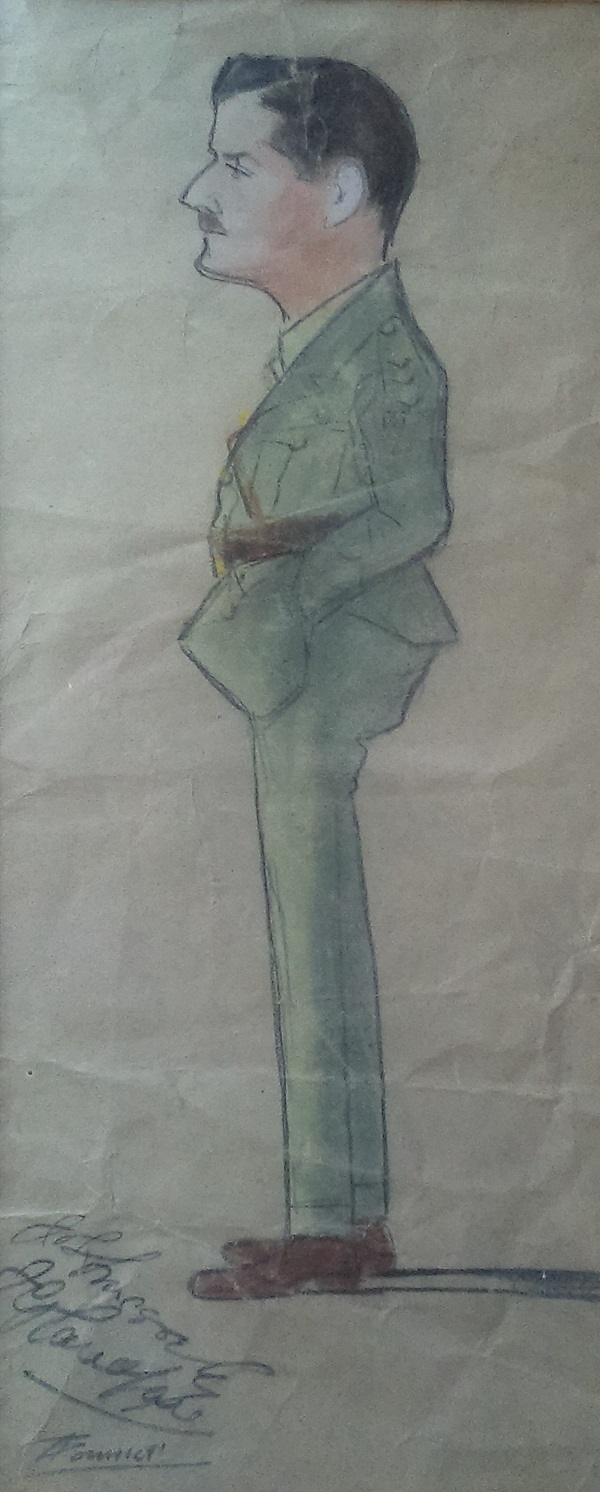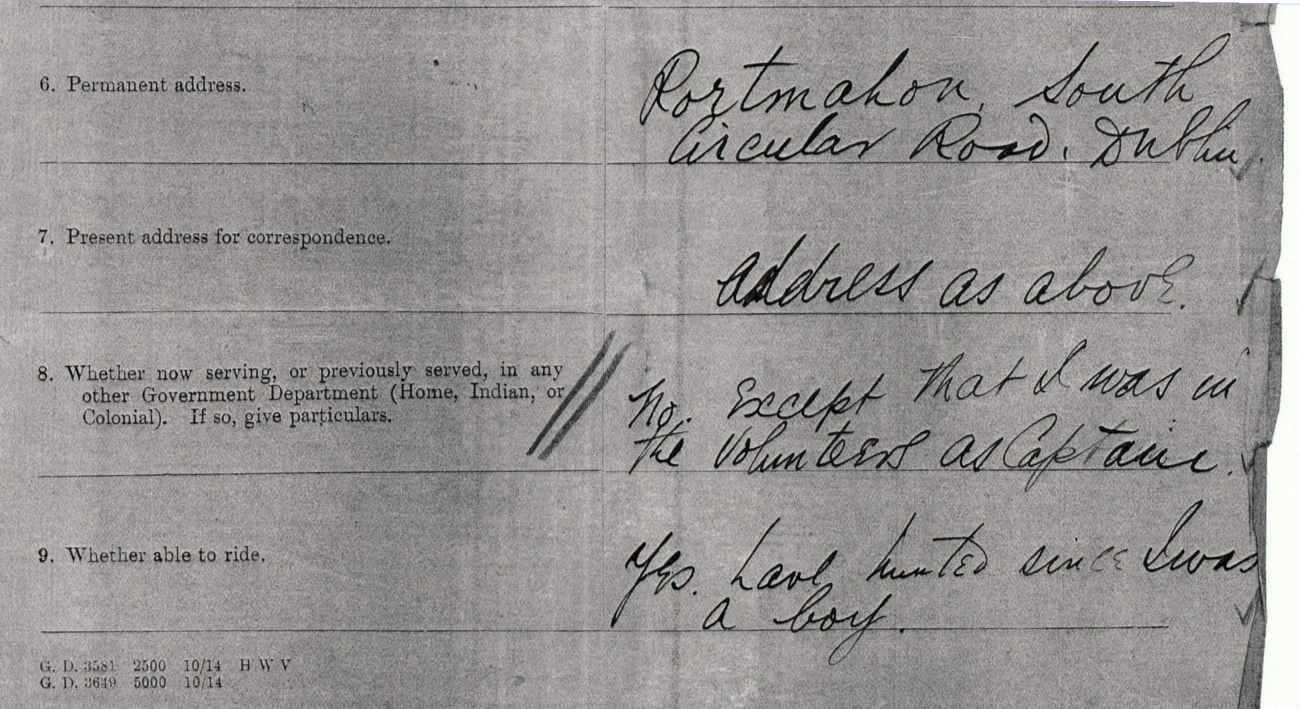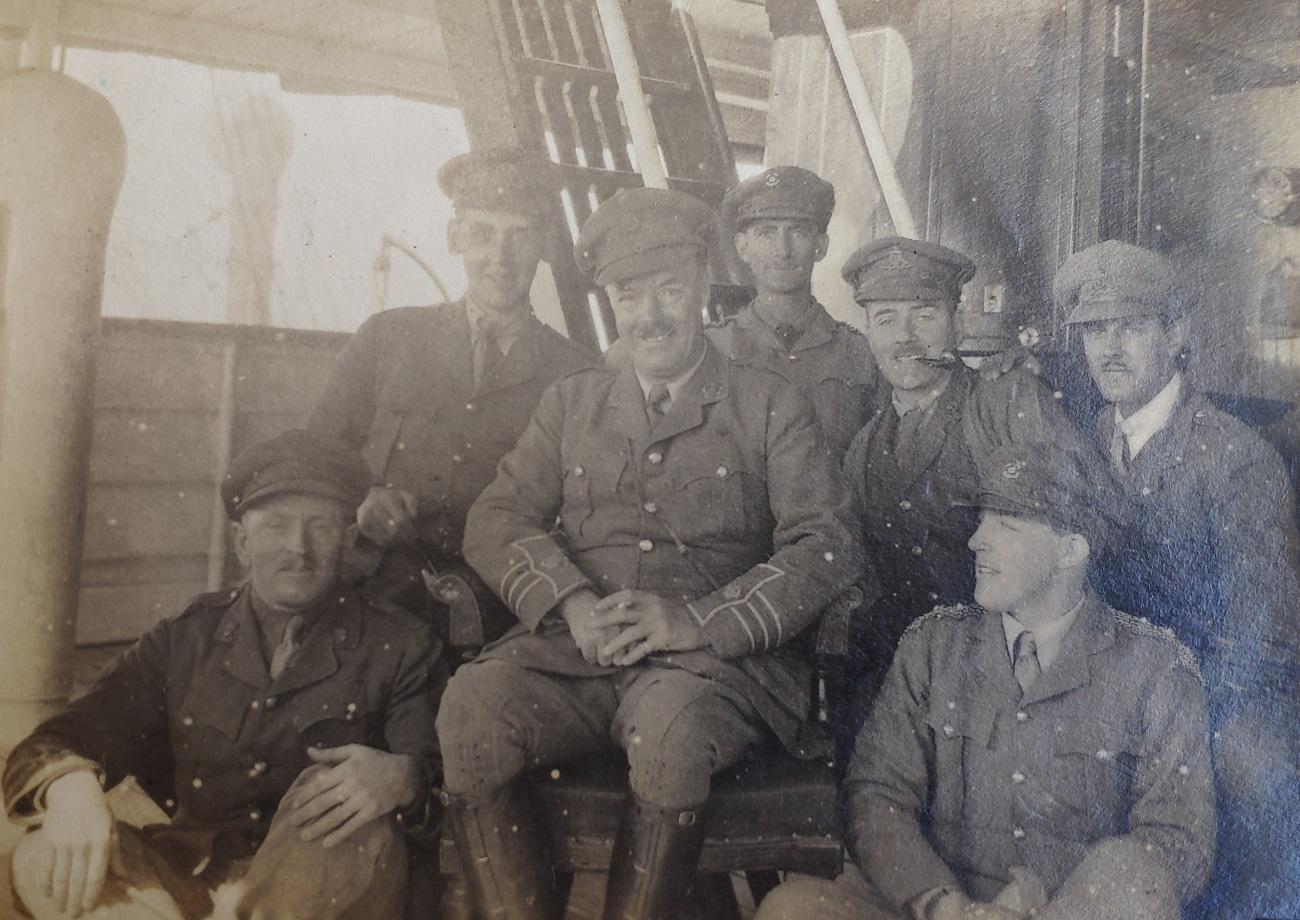
He was a member of the
Irish Parliamentary Party,
and was a
Captain
in the
John Redmond
wing of the
Irish Volunteers.
He served in the
British Army
Nov 1914 to Nov 1919.
He fought
in WWI (July 1914 to Nov 1918).
Frank started training in Mere, Wiltshire.
Because of his background (and relatively older age) he was
made an officer, in charge of Irish troops.
[London Gazette, Nov 1914]
says he was appointed on 25 Nov 1914
as a Second Lieutenant in Royal Field Artillery.
Frank was meant to have been a
Captain
but this may be confusion with his rank in the Irish Volunteers.
All British Army
records have him as
only as high as
Lieutenant.
He was in command of a Battery.
There was a conflict with his superiors at one point when he
defied orders and marched Catholic soldiers off to mass
when they were meant to be preparing for a visit from
Lord Kitchener.
In Sept 1915 he was sent to the Western Front, on the Somme, France. "conditions were frightful in the winter ... Terrible slaughter ... and failure after failure".
At end of Dec 1915 they were sent to
Salonica
(now Thessaloniki), N Greece.
They might be the
LVII (57th) Brigade, Royal Field Artillery,
which was sent to join the
10th (Irish) Division
in Greece between 16 August and 18 December 1915.
He had a number of disputes with superiors,
and was also having arguments about what was happening
in Ireland,
after the Easter Rising, Apr 1916.
On leave in London, just after
Easter Rising 1916 executions,
he had dinner with "my old friend"
T.P. O'Connor (Nationalist MP),
Joe Devlin, MP
and
Lloyd George
(who became Prime Minister Dec 1916).
The Irish MPs warned Lloyd George about the growing martyr-worship
of the dead rebels, and urged him to try to undo the damage.
He got a post in the British administration of Iraq.
He became assistant administrator
of the district round
Babylon, SC Iraq.
"The district to be looked after and policed was about the size of Wales".
This must be in and around
Hilla province.
He was
in command of "the best part of 1000 men".
[Service record]
says he was appointed "Local Purchase Officer" 30 Aug 1917.
He had a
"free and easy, and sometimes dangerous life
roaming around the desert".
He met
Gertrude Bell.
He saw the German archaeological excavations at Babylon.
He
met the famous
Colonel Leachman.
"He was the T.H. Lawrence
of Iraq" [sic].
"He and I often sat into the late night drinking scotch and soda".
Also
"In Baghdad I met the
Grand Duke Dimitri
who had been an
accomplice in the murder of
Rasputin"
[the previous year, 1916].
Dimitri had been intended for the throne by the
aristocrats who removed Rasputin, but they were overtaken by the
Mar 1917 Revolution, and he lived out his life in exile.
In Babylon one time Frank entertained
Admiral Sir Ernest Gaunt
(commander-in-chief of the East Indies).
[London Gazette, Apr 1918]
lists him as
Lieutenant.
[Service record]
says he was granted 6 weeks leave, May-July 1918.
He went to India on leave.
He was a lavishly treated guest of Admiral Sir Ernest Gaunt
in Ceylon.
He knew
Prince Ranjitsinhji,
the famous Indian cricketer.
He was
not allowed bring him into the
Bombay yacht club
(no Indians allowed).
Ranjitsinhji later came to Ireland in 1920s,
and they renewed their friendship.
Frank also became friends with
C.B. Fry.
He was replaced after an argument with
Arnold Wilson,
the colonial administrator of Iraq.
"within a month I had a letter returning me to my Battery".
His successor was installed: "took over my job and house,
and occupied the bedroom I used."
A few days later "for no reason the Arabs
shot him dead in bed."
"Wilson's action saved my life."
[WWI Medal Rolls, Nov 1919]
says he was wounded,
and was eligible for the
Silver War Badge.
It seems he never collected this medal.
It lists him as
Lieutenant.
He was entitled to but declined to draw a pension for his WWI service.


Frank Flanagan (with pipe, 2nd from RHS)
"on board ship at Basra, Iraq".
Would be 1917 or 1918.
See larger
and full size.
See other scan.

British forces recapture Kut, Iraq, Feb 1917.
From here.

British forces enter Baghdad, March 1917.
From here.

Frank retires from the army after the war, with the rank of Lieutenant.
From [London Gazette, 21 Nov 1919].

Tribute to Irish soldiers in WWI.
"One may ask why I joined the British Army.
...
I was in the Irish Volunteers and a follower of John Redmond,
and he asked us to join up and fight, thinking the British Government
would give us Home Rule as promised.
Many of my friends left the Redmond party and founded their own army
which fought in 1916.
The fight led to the founding of the Irish Free State.
They were right."
- Frank's
rather sad judgement in 1965 on his WWI service.
Please donate to support this site.
I have spent a great deal of time and money on this research.
Research involves travel and many expenses.
Some research "things to do"
are not done for years, because I do not have the money to do them.
Please Donate Here
to support the ongoing research and
to keep this website free.